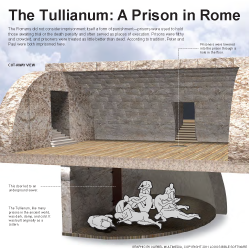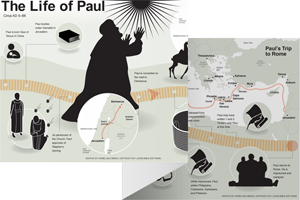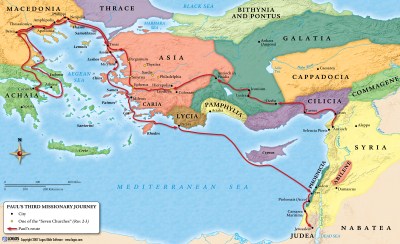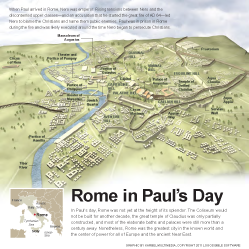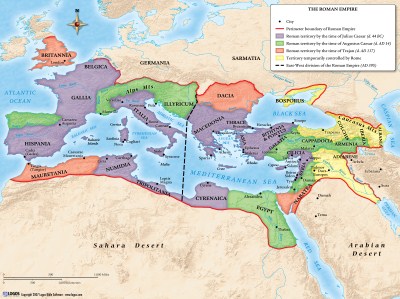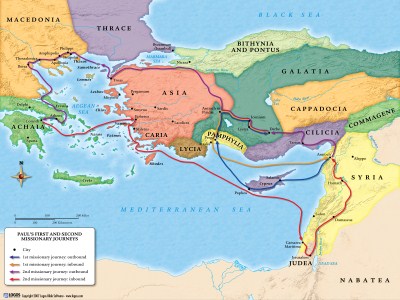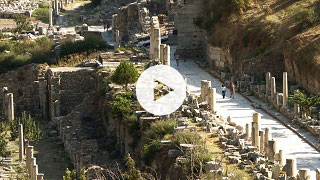1:1–2 The greeting of 2 Timothy resembles that of 1 Timothy and follows the letter-writing conventions of the time. Paul would have written this letter from prison—likely in Rome—as he awaited his trial and execution in the mid-60s ad (2 Tim 1:16–17; 2:9). This would have been his last letter (see note on 1 Tim 1:1–2). |
1:1 Paul A key apostle and missionary in the early church (see note on Rom 1:1). Timothy met Paul during Paul’s second missionary journey (circa ad 49–51) and served with him in various cities (Acts 16:1–5).
 Paul: A Life of Redemption and Transformation
Paul: A Life of Redemption and Transformation
an apostle See 1 Tim 1:1 and note.
 Pauline Self-Designations Table
Pauline Self-Designations Table
1:2 to Timothy, my dear child See note on 1 Tim 1:2.
Grace, mercy, and peace See note on 1 Tim 1:2.
1:3–7 Paul begins the main part of the letter with a thanksgiving prayer. He praises God for Timothy’s faithfulness and encourages Timothy to use his gifts well. |
1:3 served The Greek word used here, latreuō, was used to describe the service of the priests in the Septuagint (the ancient Greek version of the ot).
clear conscience Paul’s conscience was clear because of the way he ministered (see Acts 20:26–27).
as my ancestors did Paul asserts that his service to God stands in continuity with his Jewish ancestors (compare Acts 24:14).
1:4 as I remember your tears This tearful farewell may refer to Paul’s departure for Macedonia when he left Timothy in Ephesus (1 Tim 1:3). Paul also had a tearful parting with the elders of the church in Ephesus at Miletus (Acts 20:37).
1:5 sincere faith Because others have deserted Paul, he appreciates Timothy’s faith even more (2 Tim 4:10).
your mother Eunice Traditionally, Jewish boys were instructed in the law by their fathers; however, since Timothy’s father was Greek (Acts 16:1), his Jewish mother and grandmother served as examples of faith.
and grandmother served as examples of faith.
1:6 gift of God The necessary empowerment for ministry and service (see 1 Tim 4:14 and note).
laying on of my hands See note on 1 Tim 4:14.
1:7 cowardice The Greek word used here, deilia, refers to cowardice that results from a lack of moral strength. Timothy may have been fearful to fulfill his duties because of a timid personality and the intense opposition he faced from false teachers. Paul reminds Timothy that such fear does not come from God’s Spirit (compare Rom 8:15–16).
of power In this context, power refers to courage to fulfill his ministerial duties, namely, the proclamation of the gospel (compare Acts 1:8; 1 Cor 2:4; Eph 3:16).
love The greatest of the Christian virtues (1 Cor 13:13).
(1 Cor 13:13).
1:8–18 Paul continues his instructions to Timothy. Paul’s message aims to encourage Timothy in his ministerial duties, since he seems to have become somewhat ashamed of Paul’s imprisonment and the message of the cross (2 Tim 1:8, 12). Paul exhorts Timothy to remain true to the teaching that he passed on to him (vv. 13–14). |
1:8 be ashamed Paul encourages Timothy not to be embarrassed about the message of the gospel—including Christ’s shameful death on the cross (compare 1 Cor 1:23)—or his imprisonment. Instead, God’s power at work in suffering should cause Timothy to boast of the gospel without shame (compare Rom 1:16).
his prisoner Paul was imprisoned in Rome.
1:9 our works Refers to righteous or good deeds. Such deeds do not earn or merit God’s salvation (see Rom 4:5; Gal 2:16; Titus 3:4–5).
1:10 appearing Refers to the incarnation of Jesus Christ and probably the subsequent events of His life (e.g., His earthly ministry, death, and resurrection).
of Jesus Christ and probably the subsequent events of His life (e.g., His earthly ministry, death, and resurrection).
death Compare Heb 2:14.
immortality The Greek word used here, aphtharsia—which may be literally rendered as “not subject to decay”—describes a quality of life (i.e., immortal life). Christ manifested this through His resurrection. Compare 1 Cor 15:50–54.
the gospel Refers to the good news (euangelion) that permanent union with God (i.e., immortal life) is available through Christ.
(euangelion) that permanent union with God (i.e., immortal life) is available through Christ.
 Euangelion Word Study
Euangelion Word Study
1:11 was appointed See note on 1 Tim 2:7.
apostle A person designated and sent by God to speak and act with special authority. Apostles start churches, sometimes run them, and appoint leaders to govern individual and collective churches.
1:12 I suffer these things Refers to Paul’s imprisonment in Rome.
I am not ashamed See note on 2 Tim 1:8.
until that day Not the day of Paul’s death but the Day of the Lord (2 Thess 2:2; Isa 11:10–11; Joel 3:18)—the second coming of Christ.
1:13 the pattern Paul considered his life and teaching worthy of imitation (1 Cor 11:1; Phil 4:9).
1:14 Guard The Greek word used here, phylassō, means “to protect from loss or damage.” Timothy must protect the church from false teachers and their instruction. Paul reminds Timothy that the Holy Spirit will help him fulfill his ministry duties.
good deposit Refers to the gospel message. Paul urges Timothy to pass on his teaching to others (compare 2 Tim 2:2; 2 Thess 2:15).
1:15 Asia A Roman province east of the Aegean Sea (part of modern-day Turkey).
east of the Aegean Sea (part of modern-day Turkey).
Phygelus and Hermogenes These two men deserted Paul when he was imprisoned—probably because of the shame associated with imprisonment (compare 2 Tim 1:8).
1:16 grant mercy To meet the needs of someone. Onesiphorus’ household enabled him to travel from Ephesus to Rome in search of Paul. Paul recognizes their sacrifice and asks the Lord to provide for their needs in return.
household In Graeco-Roman society, the household included not only the immediate family but also slaves, laborers, and tenants.
Onesiphorus A Christian from Ephesus who searched for Paul in Rome and brought him relief while he was imprisoned. Paul honors Onesiphorus by commending him to Timothy. Unlike Phygelus and Hermogenes, who deserted Paul, Onesiphorus was not ashamed of Paul’s imprisonment.
ashamed of my imprisonment See note on v. 8.
1:17 Rome The capital city of the Roman Empire, located on the Tiber River—the location of Paul’s final imprisonment before execution.
of the Roman Empire, located on the Tiber River—the location of Paul’s final imprisonment before execution.
1:18 Ephesus A harbor city located in Asia Minor (modern-day Turkey) and one of the largest cities in the Roman Empire. Paul traveled to Ephesus on his second and third missionary journeys (Acts 18:19; 19:1). See note on 1 Tim 1:3.
on his second and third missionary journeys (Acts 18:19; 19:1). See note on 1 Tim 1:3.
Event | Approximate Date |
Paul’s first missionary journey (Acts 13:1–14:28) | ad 46–47 |
Paul’s second missionary journey (Acts 15:40–18:22) | ad 49–51 |
Paul’s third missionary journey (Acts 19:1–21:26) | ad 52–57 |

|
About Faithlife Study BibleFaithlife Study Bible (FSB) is your guide to the ancient world of the Old and New Testaments, with study notes and articles that draw from a wide range of academic research. FSB helps you learn how to think about interpretation methods and issues so that you can gain a deeper understanding of the text. |
| Copyright |
Copyright 2012 Logos Bible Software. |
| Support Info | fsb |
 Loading…
Loading…

